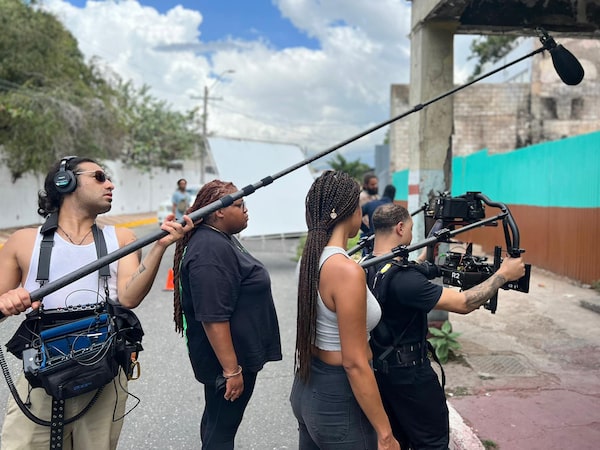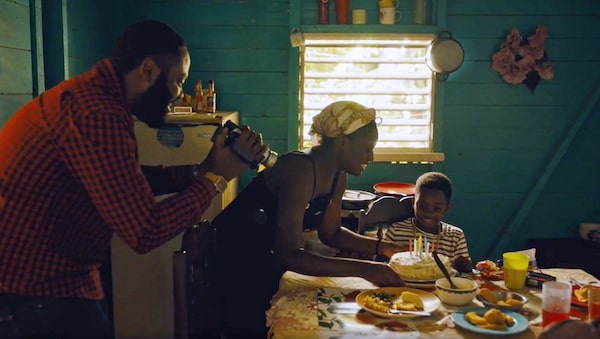
Kelly Fyffe-Marshall, Canadian director of When Morning Comes. Courtesy of Sunflower Studios.Courtesy of Sunflower Studios
A remarkable achievement in Black Canadian filmmaking, writer-director Kelly Fyffe-Marshall’s 2020 short, Black Bodies, won the Changemaker Award at TIFF 2020, the 2021 Canadian Screen Award for Best Live Action Short Drama, as well as the Toronto Film Critics Association’s 2020 Stella Artois Jay Scott Prize for an emerging artist.
The writer-director’s daring work, which focused on the aftermath of police brutality, was initially all but ignored by Canadian media, but once the Brampton, Ont.-based storyteller received a co-sign from U.S. director Ava DuVernay, so, too, came attention from north of the border.
Which is all to say that the anticipation surrounding Fyffe-Marshall’s feature debut, When Morning Comes, is unmistakable. Supported by $50,000 in post-production services awarded by Canadian director David Cronenberg, the British-born director’s film is a vibrant, poetic coming-of-age story set in 2001 Kingston, Jamaica. Following a young boy named Jamal who must navigate his mother’s choice to send him to Canada, the film makes its world premiere at the Toronto International Film Festival Sept. 12, and will also be available as part of the festival’s digital slate.

When Morning Comes by director Kelly Fyffe-Marshall.Courtesy of Sunflower Studios
Ahead of the festival, The Globe and Mail spoke with Fyffe-Marshall about the role of storytelling in paying tribute to whom and what we love, and the complex feelings that come with leaving one home for another.
The 15 buzziest movies that you can’t miss at this year’s Toronto International Film Festival
This film feels like a love letter to Jamaica – it’s so lush, rich and layered.
As someone who grew up there, I never saw the Jamaica that I experienced portrayed in the media. It’s the cultural capital of the world – so many things that we do as a people reverberate throughout the world, but too often we only see stereotypes represented.
I loved your film’s ability to hold hope with the same weight as grief. Rather than ceding to a naive notion that life in the West will be better, Jamal’s uprooting shows us what he will miss, and dearly so.
I’m interested in navigating this kind of duality – we don’t talk enough about the ability for two different things to be true at once. Being able to speak to the duality of immigration was important to me because, when I left England, I had those same feelings. It was this new world that I was about to explore but, at the same time, I was also leaving so much behind. In Canada, especially in Toronto, where we often speak about being a cultural mosaic, where so many of the people who live here are immigrants, we don’t appreciate what they’ve been through. All the sacrifices it took them to get here, regardless of where they are from.
The children in your film are wonderfully portrayed, especially in how you’ve depicted them as having their own worlds. How did you approach that?
Growing up in a Jamaican household, we were always told to listen to our elders but as a society, we are never told to listen to young folks. They’re so in touch with their emotions; they manoeuvre through the world and see it differently. In terms of Jamal’s character, I thought a lot about who I was at his age, how I wanted to be seen and heard. Creating this space – especially because in Jamaica you’re given independence a lot earlier than you are in Canada – was important. A lot of the things that happened to Jamal are things that I experienced as a child in Jamaica. However small, they were these big moments for me that, as a child, I romanticized and saw the poetry in.
Both Black Bodies and When Morning Comes speak to Black women and the mourning that they too often experience. How you were able to honour the experiences of Jamal’s mother in the film without compromising her capacity for a life beyond grief?
It was important to me to give over space to this character to live beyond how we normally see Black women represented onscreen. I thought about my mother and all of the things that she had to do for our family. This film was not just a love letter to Jamaica, but also a love letter to her. It’s a chance for me to say that I appreciate the sacrifices and struggles that she took on all by herself, and the way that she was able to navigate the world and find better for us. The film is dedicated to the people who sacrifice everything in order for Black babies to thrive.
This interview has been condensed and edited
When Morning Comes screens Sept. 12, Sept. 15 and Sept. 17 at TIFF (tiff.net); it will also be available digitally across Canada as part of TIFF’s digital Lightbox selection Sept. 15
Special to The Globe and Mail
Plan your screen time with the weekly What to Watch newsletter, with film, TV and streaming reviews and more. Sign up today.